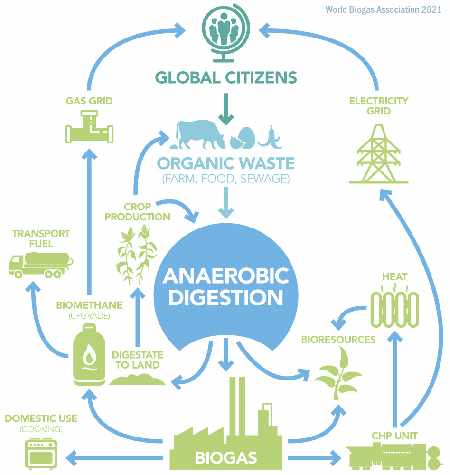The Anaerobic Digestion and Bioresources Association (ADBA) has again voiced its disappointment with the UK government's lack of leadership and commitment to anaerobic digestion (AD), following the release of the Climate Change Committee's latest progress report.
The ADBA emphasizes that AD has the potential to
- significantly reduce the country's greenhouse gas emissions,
- support the achievement of global methane reduction targets, and
- create numerous green jobs.
This article will explore the reactions of the ADBA and other organizations to the government's climate change progress and discuss the implications for achieving the net-zero target by 2050.
Anaerobic Digestion and Climate Change Targets:
Anaerobic digestion is a process that converts organic waste into biogas, which can be used to generate renewable energy and produce biofertilizers. The ADBA highlights that AD has the potential to reduce the UK's greenhouse gas emissions by 6% by 2030. However, the trade body expresses concern over the government's lack of focus on AD, despite its significant potential to contribute to climate change mitigation efforts.
Chris Huhne, Chairman of ADBA and former Energy and Climate Secretary, states that the government is merely:
“coasting into the future” and calls for greater commitment and leadership in promoting AD as a key solution for meeting climate change targets.”
We have included the full ADBA Press Release at the bottom of this page.

Other Bodies Also Express Concerns Over EfW Emissions:
In addition to the ADBA's disappointment, the Committee on Climate Change (CCC) has raised concerns about the emissions from the energy from waste (EfW) sector.
The CCC's annual progress report highlights the need for a moratorium on new EfW plants, as they undermine efforts to reduce emissions within the waste sector.
The CCC emphasizes the importance of recycling systems and packaging changes to boost recycling rates and reduce waste sent to incineration.
The committee also stated that modifications to recycling systems and packaging have the potential to increase recycling rates and reduce the amount of garbage that is sent to incineration and landfills.
However, the committee voiced frustration at the slow speed at which this is occurring. The organisation also stated that it is essential to enact “stronger policies and signals” to limit the expansion of waste-to-energy facilities, redirect biodegradable trash away from landfills, and promote waste avoidance. These are all things that the organisation believes should be prioritised.
The UK “Without Incineration Network” and the Environmental Services Association (ESA) also support the CCC's call for a pause on approving incinerator planning applications. They argue that a permanent moratorium on incineration is necessary to align with the CCC's recommendations and prevent a surge in emissions resulting from new plant developments.
Decarbonization and the Waste Sector:
The CCC report stresses the urgency of decarbonizing the waste sector and calls on the Department for Environment, Food, and Rural Affairs (Defra) to publish a detailed plan for achieving this goal. The report recognizes the potential of waste-to-energy technologies, such as anaerobic digestion, in reducing carbon emissions.
Mike Maudsley, Chief of Enfinium, emphasizes the importance of rapid decarbonization of the waste sector and highlights Enfinium's contribution to transforming unrecyclable waste into electricity, avoiding significant carbon emissions.
The report elaborated on the necessity of “greater strategic coordination of plans to decarbonize the waste sector” and emphasised the need for greater waste reduction policy. It requested that Defra publish a comprehensive plan for decarbonizing the waste management industry.
In response to the report, Mike Maudsley, the chief executive officer of Enfinium, made it clear that the company strongly supports the call to rapidly decarbonize the waste sector. Over two million tonnes of non-recyclable waste are converted into dependable, indigenous electricity every year at Enfinium's four decarbonization hubs located throughout the UK. By acting in this manner, we save 500,000 tonnes of carbon emissions from being released into the atmosphere.
In addition, Mr Maudsley opined, that the Uk waste industry would be able to go further to support the decarbonization of the UK than the government seems to think. This can be done through the utilisation of carbon capture, if encouraged by government policy the industry would be able to remove more than one million metric tonnes of carbon from the atmosphere on an annual basis and permanently store it underneath the surface of the earth.
The industry may also lend our support to the establishment of new heat networks and the production of electrolytic hydrogen from discarded materials but the government needs to show leadership first.
Charlotte Rule, the ESA's climate and energy policy advisor, echoes the CCC's message and emphasizes the need for recycling and packaging reforms to reduce emissions associated with residual waste treatment.
The ESA also calls for policies that drive change, up the waste hierarchy and measures to prevent waste from returning to landfill or incineration.
Climate Change Committee's Latest Progress Report Should be Used as a Climate Change Action Wake-Up Call by Politicians
The Climate Change Committee's latest progress report could have a very effective outcome if politicians read it and listen.
On a broad level, the chairman of the Environmental Audit Committee, Rt Hon Philip Dunne MP, stated that the CCC's newest report “makes for concerning reading and should serve as a wake-up call to Ministers.”
“While the Government has indicated the ‘what' it intends to deliver, gaps in the ‘how' to achieve through policy levers remain, leaving stakeholders unsure whether the UK is properly on track to meet its net zero commitments,” he indicated. This risks instilling insufficient confidence in investors seeking to support the UK's net zero transition: existing demand signals to investors are unclear and inconsistent.
The CCC has clearly indicated what policy initiatives are needed to get Ministers to where they need to be to achieve Net Zero Britain. Unless and until bold policy guidance is provided, the government risks unwinding the last several years of climate leadership, which was fueled by the UK's hosting of COP26 in Glasgow and its landmark accords.
Are we optimistic. Not really! We said all this in 2020, here!
Conclusion
The reaction of the ADBA and other organizations to the government's climate change progress report highlights the need for greater commitment and leadership in promoting anaerobic digestion as a key solution for reducing greenhouse gas emissions.
The concerns raised by the CCC regarding EfW emissions and the potential of recycling and waste reduction measures demonstrate the importance of comprehensive strategies to achieve decarbonization in the waste sector.
To meet the net-zero target by 2050, the government must prioritize and invest in renewable energy sources, including anaerobic digestion, and implement policies that promote recycling and waste reduction. By addressing these issues, the UK can make significant progress in reducing its carbon footprint and contribute to global efforts in mitigating climate change.
Official ADBA Press Release 29 June 2023:
UK anaerobic digestion trade body reacts to the Climate Change Committee’s latest progress report
 The Anaerobic Digestion and Bioresources Association (ADBA) has reacted with disappointment to the publication of the UK’s Climate Change Committee’s latest progress report to Parliament. ADBA is alarmed by the UK Government’s continued lack of leadership and commitment to anaerobic digestion (AD), an industry that could reduce the UK’s greenhouse gas emissions by 6% by 2030, support the UK in meeting its Global Methane Pledge, and create tens of thousands of green jobs.
The Anaerobic Digestion and Bioresources Association (ADBA) has reacted with disappointment to the publication of the UK’s Climate Change Committee’s latest progress report to Parliament. ADBA is alarmed by the UK Government’s continued lack of leadership and commitment to anaerobic digestion (AD), an industry that could reduce the UK’s greenhouse gas emissions by 6% by 2030, support the UK in meeting its Global Methane Pledge, and create tens of thousands of green jobs.
Chris Huhne, Chairman of ADBA and former Energy and Climate Secretary, said: “Ministers are just coasting into the election. There is no urgency, and we have lost any sense of experimenting with new policies and ideas to tackle the climate crisis. The UK is no longer a climate leader, and the case of green biogas is just another good example where both the USA and the EU are passing us in the fast lane.”
The Green Gas Support Scheme (GGSS) currently provides financial support for new AD plants injecting biomethane, but it will close in November 2025. ADBA agrees with the CCC recommendation that the government must develop a post-scheme strategy to support biomethane generation and its injection into the natural gas network, and that carbon capture, usage and storage should also be supported to facilitate its production.
Fully deployed, the AD sector could produce enough biomethane to power 18 million households by 2030 while supplying 100% of the country’s commercial CO2 demand. The CCC also states that the government must drive action to help the AD sector reach this potential, starting with the launch of the Biomass Strategy and the immediate publication of the outcome of the Consistency in Household and Business Recycling in England consultation.

-ENDS-
UK Anaerobic Digestion – June 2023 Update:
But it is not all bad news!
The world is witnessing an unprecedented push for sustainable solutions, and in the United Kingdom, the anaerobic digestion (AD) and biogas industry are at the forefront of this environmental revolution.
727 Operational UK AD Plants!
The UK currently already boasts a whopping 727 operational AD plants, exemplifying the nation's commitment to sustainable waste management.
These plants collectively process a staggering 46 million tonnes of organic material each year, preventing the release of greenhouse gases that would otherwise occur if left untreated in landfills. By harnessing the power of anaerobic digestion, the industry has become an environmental champion, playing a pivotal role in mitigating climate change.
The Power of Biogas
One of the most remarkable achievements of the AD industry is the production of an estimated 19.7 TWh of biogas annually.
This environmentally friendly fuel source is utilized in two primary ways: as a clean energy generator through combined heat and power (CHP) units, or after upgrading to biomethane, it is injected directly into the national gas grid. To put things into perspective, this abundance of green gas is enough to provide heating for 1.6 million UK homes, reducing dependence on fossil fuels and paving the way for a greener future.
Driving the Green Economy
The AD and biogas industry isn't just making waves in terms of sustainability; it's also an economic powerhouse. With approximately 4,800 individuals currently employed in the sector, this industry is not only shaping a sustainable future but also creating significant job opportunities. Looking ahead to 2030, the potential impact is staggering.
It is projected that the fully deployed UK AD and biogas industry will create 30,000 direct jobs and an additional 30,000 indirect jobs, boosting the economy while fostering environmental stewardship.
A Quantum Leap in Carbon Reduction
The environmental benefits of AD cannot be overstated. By 2030, the industry is expected to save a staggering 27 million tonnes of CO2 equivalent.
To put this into perspective, it is like removing one-third of all cars from the roads, a monumental achievement in combating climate change. These carbon savings will play a vital role in achieving the UK's emission targets and driving a sustainable transition to a greener and cleaner future.
Powering Homes with Biomethane
The potential of biomethane, an upgraded form of biogas, is immense. The AD industry's estimated 8 billion m3 of biomethane generated annually has the potential to heat an impressive 4.5-6.4 million UK homes.
This renewable energy source not only reduces greenhouse gas emissions but also offers a reliable and sustainable alternative to conventional heating methods. By harnessing the power of biomethane, the AD industry is reshaping how homes are heated, ensuring a warm and sustainable future for millions of households.
End Note
The UK anaerobic digestion industry, guided by the Anaerobic Digestion and Bioresources Association (ADBA), continues to prove itself as a beacon of sustainability and innovation. With hundreds of operational plants, impressive biogas production, job creation, and substantial carbon savings, the industry is undeniably a driving force behind the country's green transition. By leveraging the power of anaerobic digestion, the







